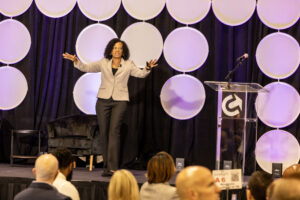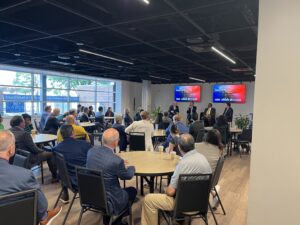On Feb. 24, the world awoke with news of Russia’s invasion of Ukraine. Nearly 50 days later, the search for peace continues.
Much is yet to be discovered about the conflict in Ukraine. For instance, the cost of this war. Some experts estimate the conflict could impact our global economy by at least $400 billion this year, not including the cost of life in thousands of casualties and millions displaced.
In the U.S., we’ve seen an outpouring of support for Ukraine — with national and international brands altering their logos in solidarity.
Support is also seen here in Chattanooga, where Tennessee Aquarium’s lights shined blue and yellow shortly after the conflict began. Chattanooga Public Library displayed sunflower seeds to raise awareness. Southside Social owner, John Wise, raised approximately $5,600 for relief efforts in Ukraine.
Most of us have been affected by war images flashing through our newsfeeds. We’ve debated around the dinner table on what actions to take. We’ve drawn inspiration from the courage and spirit of the Ukrainian people. But, for those in Chattanooga’s Ukrainian and Slavic communities, the conflict hits closer to home.
Over the years there’s been a steady rise of Ukrainian communities in Cleveland, Tennessee and Chattanooga – drawn here by the same factors that make the Scenic City one of Tennessee’s best places to call home.
A Google search reveals at least four Slavic churches across Chattanooga, Ooltewah and Cleveland – the most prominent being Slavic Christian Church in Ooltewah, Ukrainian Gospel Church in Bonny Oaks, and Chattanooga Slavic International Seventh Day Adventist in Collegedale, Tennessee.
The conflict affects those around us – family members and community leaders, business owners, realtors and mortgage bankers like Val Protsenko of LeaderOne Financial.
Protsenko, of Ukrainian descent, joined as a Chamber member in December. Recently, Protsenko partnered with his sister Luba to offer humanitarian aid for Ukraine. Together they’ve sent clothes and medical supplies to churches in western Ukraine, aiding those fleeing combat zones.
“Churches are a network and all believers are a network. We’ve been sending supplies and funds to give churches ways to host all refugees. There is a huge need for personal hygiene products – especially for kids — baby formula and things like that,” Protsenko says.
Protsenko leverages the connections his sister built during a recent mission trip — sending first aid kits, diapers and food to those compatriots in need. Most of these items are sent to family and friends in nearby bordering countries who distribute supplies to relatives in Ukraine.
The effects of this conflict have reached our continent. At the moment, there are thousands of Ukrainian refugees on the Mexican-American border seeking asylum. Recent reports reveal the U.S. is expected to accept around 100,000 refugees into the country and local organizations like Bridge Refugee Services anticipate many Ukrainians will re-settle in Chattanooga.
As more Ukrainians enter Chattanooga’s workforce in the coming years, Protsenko asks that local companies keep an open mind to those in our communities seeking a better quality of life.
“Keep an open heart and check-in with regards to Ukrainians here in Chattanooga. Look past the language barrier if there is a job that we can do to support our families. There are a lot of jobs that are universal everywhere,” Protsenko says.
As Protsenko explains, one of the best ways to immediately help those undergoing this conflict is by voicing support or contacting the network of Slavic churches in the area. Gently used and prewashed clothing donations are also being accepted which will most likely go toward those on the border seeking asylum.
Other ways to lend a hand are through financial support to help cover the cost of shipping or supporting local Slavic businesses in town.
In an email conversation, Protsenko writes:
“Up until the war in Ukraine, not much was known about the country and its people by the public. In fact, many people thought that Russia and Ukraine were pretty much the same country. Ukrainians are hardworking and don’t ask for help unless it’s vital —we are learning to do so now by building these networks of support.”
Find more ways to help, here.






